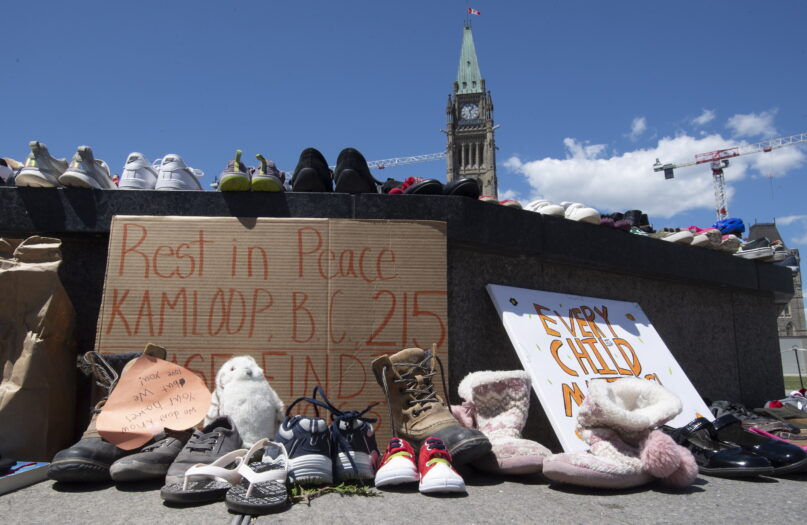VATICAN CITY (AP) — Pope Francis has agreed to visit Canada to help efforts at reconciliation with Indigenous peoples following shocking revelations of the Catholic Church’s role in the abuse and deaths of thousands of native children, the Vatican said on Wednesday.
In a brief statement, the Holy See’s press office said the Canadian Conference of Catholic Bishops invited the pope to make an apostolic journey to Canada “also in the context of the long-standing pastoral process of reconciliation with Indigenous peoples.”
In return, Francis “has indicated his willingness to visit the country on a date to be settled in due course,” the statement said.
The pilgrimage could be the occasion for a papal apology that has been demanded by many in Canada.
Francis had already agreed to meet in December with Indigenous survivors of Canada’s notorious residential schools amid calls for a papal apology for the Catholic Church’s role. At that time, the bishops conference said the pontiff had invited the delegations to the Vatican and would meet separately with three groups — First Nations, Metis and Inuit — during their Dec. 17-20 visit. The pope will then preside over a final audience with all three groups Dec. 20.
On Wednesday, Toronto Cardinal Thomas Collins said the December encounters will help lay the groundwork for the Canadian pilgrimage. “Over the course of several days, through authentic listening and dialogue, Pope Francis will hear directly from those who have suffered,” said the cardinal in a statement.
Collins said that his country’s bishops had apologized earlier this year as they “sorrowfully acknowledged the historical and ongoing trauma and the legacy of suffering and challenges faced by Indigenous peoples that continue to this day.”
The cardinal added that he was praying the pope’s visit will allow for healing and dialogue to continue “through authentic encounters of compassion, understanding and reconciliation.”
In Canada, Cowessess First Nation Chief Cadmus Delorme said a papal visit would be a step toward reconciliation. But he said it would have to come with an apology from the church to validate the pain many survivors still live with today.
“An apology is the beginning,” Delorme said. “An apology is required, and the rebuilding of a relationship would follow the apology.”
Assembly of First Nations National Chief RoseAnne Archibald echoed the call for a “long overdue” apology. In a post on social media, she added that there should also be criminal charges and reparations.
Earlier this year, investigators in Canada using ground-penetrating radar have reported finding hundreds of unmarked graves at the sites of two residential schools for Indigenous children. The discoveries — more than 600 graves in one school, 215 bodies in another — revived calls, including from Canadian Prime Minister Justin Trudeau, for the pope to make a formal apology.
From the 19th century until the 1970s, more than 150,000 Indigenous children were forced to attend state-funded Christian boarding schools in a campaign to assimilate them into Canadian society. Thousands of children died there of disease and other causes; others never returned to their families.
Nearly three-quarters of the 130 residential schools were run by Roman Catholic missionary congregations. Others were run by the Presbyterian, Anglican and the United Church of Canada, which today is the largest Protestant denomination in the country.
The Canadian government formally apologized for the policy and abuses in 2008. In addition, the Presbyterian, Anglican and United churches have apologized for their roles in the abuse.
In response to the Vatican’s announcement on Wednesday, Canada’s Minister of Indigenous Relations Mark Miller said he expected from the pontiff “full recognition of the harm caused to the Indigenous peoples.”
“In the grand scheme of what we call reconciliation for Indigenous peoples, that full recognition is something that is long awaited for from the Holy Father himself,” Miller said.
The newly elected head of the Canadian bishops’ conference, Bishop Raymond Poisson, expressed hope that the pope’s visit to Canada “will be a significant milestone in the journey toward reconciliation and healing.”
——-
Associated Press Writer Rob Gillies in Toronto, Canada, contributed to this report.





